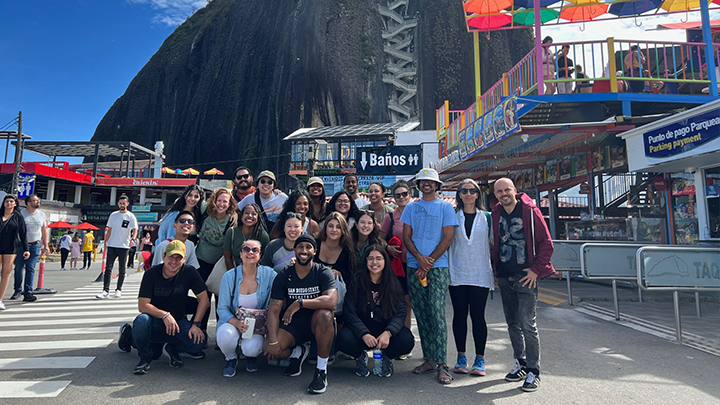MFT Students Explore Difference, Transformation and Healing in Colombia

When Jezreel Cornel returned to San Diego from Medellín, Colombia in mid-November, he was struck by something he’d never noticed before about his hometown — an almost eerie silence.
“Colombia hits different,” said the master’s student in San Diego State University’s Marriage and Family Therapy (MFT) program. “There's a level of noise and ambiance in Medellín — honking horns, music and everything else — but it's so comforting and so communal. It's just life.
“It was just beautiful to be a part of that.”
Cornel was one of 21 MFT students who traveled in Colombia from Nov. 4-11 as part of a study abroad program led by marcela polanco, associate professor in the Department of Counseling and School Psychology. The experience was a collaboration with the family therapy program at the Universidad Pontificia Bolivariana, giving SDSU students a chance to see counterparts’ clinical traineeship sites and allowing students from both countries to exchange knowledge and experiences across cultures.
This is the fourth time polanco, who grew up in Colombia, has taken MFT students abroad in Latin America, twice in Mexico City and last year in her hometown of Bogota. She sees it as an invaluable opportunity for her students to explore not only another culture, but themselves.
"I think that we emphasize interculturality quite a lot within the context of the U.S.,” polanco said. “But I think it's important for students to leave (the country) to understand what it means to be part of the U.S. and the influence it has in other places in the world. Some of our students in our program are students of color and sometimes come from experiences of disadvantage. But in Colombia, because they come from the U.S. and speak English, that alone puts them in a position of privilege.
“So that also conveys an idea for students that our social positions are culturally negotiated.”
A Renewed Sensibility
Medellín itself is an apt place for future therapists to examine pain and healing. The sprawling city of more than 2 million residents in the Andes Mountains was a focal point in the decades of armed violence that gripped Colombia. In the 1990s, it was considered one of the world’s most dangerous cities. Today, it is known as a safe and desirable tourist destination.
SDSU students were able to enjoy the city — its culture, cuisine and nightlife — as well as nearby Guatapé, known for its vibrant art and majestic rock formations that tower over the town. The idea, polanco said, was to give students a “renewed sensibility” through the aesthetics of their surroundings.
“We made sure to visit some of the areas that were really strongly affected by violence and learn a little bit about how the architecture, the aesthetics and the community have transformed,” she explained.
Communicating Across Cultures
During the crosscultural encounter, students got to know one another despite often lacking a common language. Working without translators — very much by design — students would sit with one another and attempt to share experiences of suffering in their own backgrounds through gestures, facial expressions and images.
SDSU student David Valencia was fascinated by the difference in group dynamics. He said that during group exercises, he noticed the (U.S.) students were often paralyzed by what he called “the politics of politeness” which often led to groupthink. Not so with their Colombian counterparts.
“We were kind of fumbling over our feet a little bit because we were like, ‘Oh, did we ask everybody — were we polite?’” Valencia said. “I think the Colombian cohort, once momentum got going, they really carried us. They seemed vastly more authentic to themselves.
“That makes me look back on some of the ways we govern ourselves here in the States and makes me kind of giggle. It’s like like, ‘OK, maybe I don't have to take myself so seriously.’”
Grateful Guests
Reciprocity was an important consideration for polanco, who was careful not to perpetuate exploitative patterns that have often been present in academic tourism — and in the U.S. relationship with Latin America more generally. She expressed gratitude to Universidad Pontificia Bolivariana and program director Johanna Jazmín Zapata Posada for their hospitality and valuable participation in the exchange.
“I was in ongoing conversations with the faculty at the university on how this would be mutually beneficial for both universities and both cohorts,” she said. “We created activities throughout the week where students could exchange their experiences and knowledge from their own practices — not one to the other, or vice versa, but a real opportunity for intercultural exchange.
“The students and I were really appreciative of the efforts of the university that hosted us. They were very kind, accommodating and made us feel at home.”

